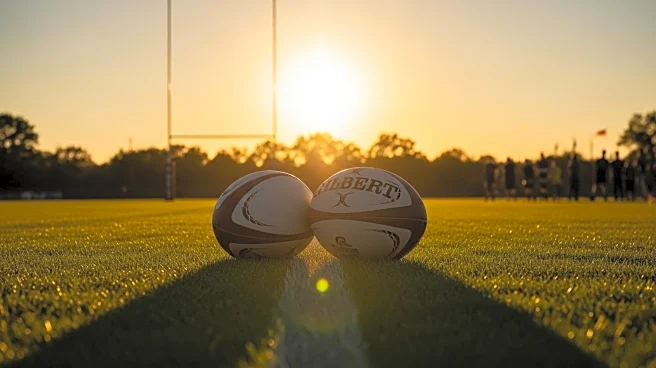What is the story about?
What's Happening?
The Quinnipiac University rugby team is aiming for a successful season despite a challenging start. After a significant loss to Dartmouth, the team rebounded with a 33-14 victory over Brown. Head coach Becky Carlson emphasized the importance of resilience and the team's determination to return to championship form. With 13 players leaving and 11 new players joining, the team faces the challenge of building cohesion. First-year player Carolyn Melody highlighted the focus on continuity and keeping the ball alive as key strategies. The team is shifting its approach by concentrating on internal improvements rather than focusing solely on opponents' strategies. This new method showed promise in their recent win against Brown.
Why It's Important?
The Quinnipiac rugby team's journey is significant as it reflects broader themes of resilience and adaptation in sports. The team's ability to bounce back from a heavy defeat demonstrates the importance of mental toughness and strategic adjustments. Success in this season could enhance the program's legacy, which includes three NIRA National Championships, the last in 2017. The team's focus on internal development rather than external scouting could serve as a model for other sports teams facing similar challenges. A successful season could also boost morale and attract new talent to the program, reinforcing its competitive standing in collegiate rugby.
What's Next?
Quinnipiac rugby will continue to refine its strategies and focus on internal improvements as it faces upcoming challenges, including a match against Sacred Heart, a formidable NIRA rival. The team aims to surpass last season's record and secure a spot in the NIRA tournament. Coach Carlson and the players are committed to maintaining their momentum and addressing areas for improvement in practice sessions. The team's progress will be closely watched by supporters and could influence future recruitment and training methods.
Beyond the Headlines
The Quinnipiac rugby team's approach highlights the importance of adaptability and resilience in sports. The shift from opponent-focused strategies to internal development could lead to long-term benefits, fostering a culture of continuous improvement. This mindset may influence other teams within the university and beyond, encouraging a focus on self-assessment and growth. The team's journey also underscores the role of leadership in navigating transitions and maintaining team morale during challenging periods.














